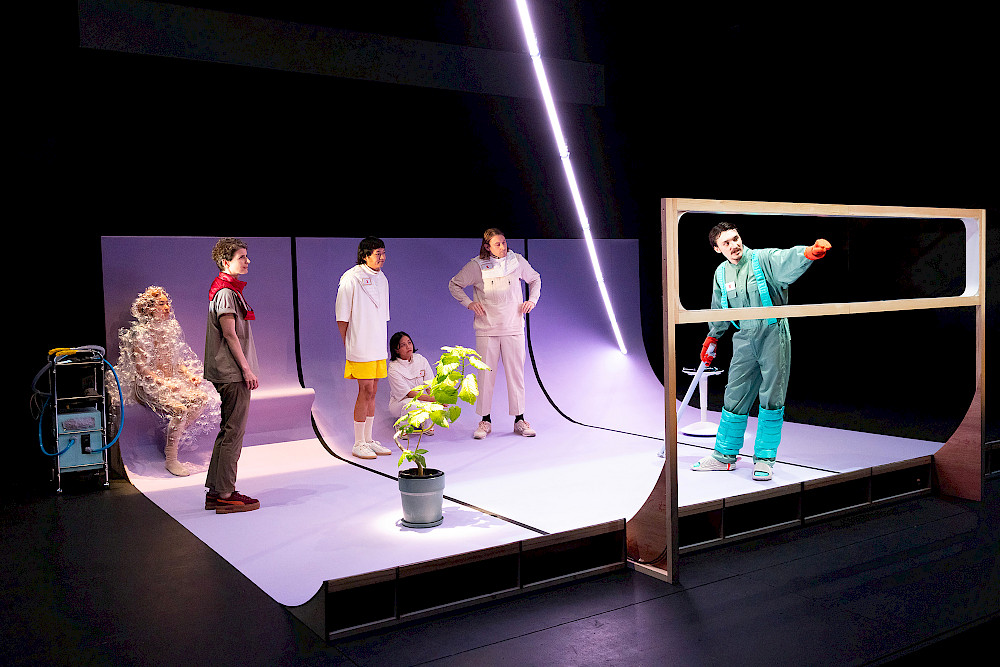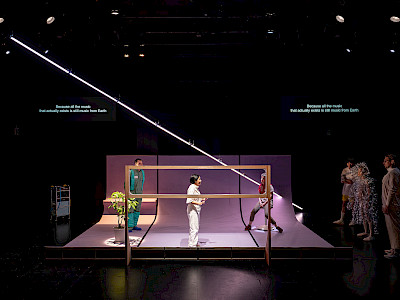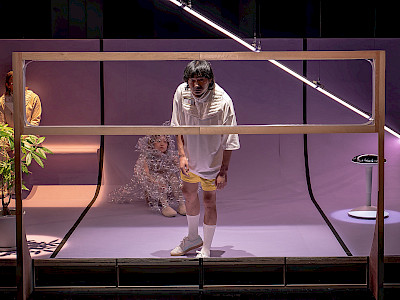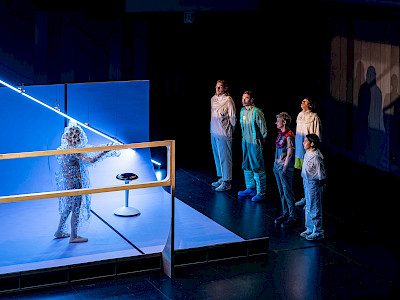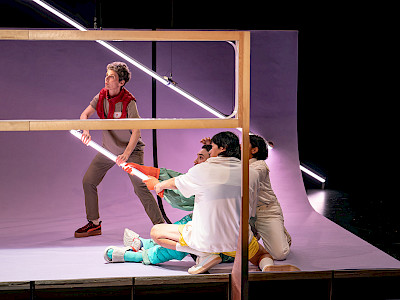18 — 20.05.2024
The spaceship ‘In-Between’ travels through the universe with a crew of four humans and an android tasked with exporting the Japanese language to other galaxies. Toshiki Okada creates this theatrical gem, in which a science fiction reality meets the everyday poetry of group dynamics in a confined space. For this project, he decided to work with four actors who are not native Japanese speakers. By making them custodians of Japanese culture, Okada reminds us that language simply belongs to those who speak it while using the spaceship as a metaphor to critically reflect on Japan’s colonial past in Southeast Asia, its linguistic expansion and the politics of language. Before our eyes, the four humans interact with the android and an alien that appears on board while the spaceship passes through a space time tunnel. Together, they open a delicate dialogue on origins and nostalgia for the earth. From the window, we observe them, or perhaps they observe us, those who remain on earth. Suddenly, ‘In-Between’ isn’t just the name of a spaceship or a tunnel between two areas of the galaxy, but a hymn to the identities that exist beyond a defined one, in between. Toshiki Okada returns to the festival with a performance of rarefied beauty, suspended in the absence of gravity.
Opening New Possibilities for Language in Theatre
The Window of Spaceship ‘In-between’ is part of a larger project you initiated in 2021 to create theatre with non-native Japanese speakers. I believe you said you started this project with the hope of opening new possibilities for the Japanese language in theatre. Although there have been workshops and other activities, this is the first theatre work you have created as part of this project. After the decision to work with non-native Japanese speakers how did you develop the framework for this theatre work?
I’m interested in the position language has in theatre and I thought this project would be a way to play with this. Obviously, I am Japanese and I write my work in Japanese so for me the language I do this in happens to be Japanese. But I don’t think the project is about something unique to the Japanese language. It’s about what position non-native language has within a society. There is naturally a particular environment in Japan that has its own unique characteristics. That has no doubt influenced me in some way. Anyway, these are the two things that I was initially thinking about; non-native speakers of a language and the position of language in theatre. If I explain a little more; in theatres in Japan, Japanese is predominately spoken. However, the language that an actor speaks on stage may not be the same as the language the character that actor is playing is speaking. This is easy to understand if we look at plays in translation. Let’s take for example a Shakespeare play performed in Japan that has been translated into Japanese but is not set in Japan: the actor is speaking Japanese however the character they are playing is most probably not speaking in Japanese. I guess this is the theatre equivalent of dubbing in films. Despite this, in a dubbed film the dubbing is automatically very obvious to the viewer. In theatre I think this can happen without the audience really realising and I find this fascinating. When I first decided to do this project, I basically thought a lot about the potential this had to be played with. With this in mind I started to think about the narrative and setting for the work. Whenever I create a work I always think about content and form together and how the 20 combination of these should be interesting. I thought about setting the work in Japan with characters like international students studying abroad or any people who live in Japan that don’t speak native Japanese. However I didn’t think this would be very interesting. I thought perhaps setting the work in Japan itself was uninteresting. Oh, perhaps setting it say 1000 years ago in Japan might be interesting! Anyway I thought if we’re not setting it in Japan then perhaps somewhere outside Japan. That didn’t really seem to be the answer either and I eventually realized that the solution was to set it somewhere other than Earth!
Right, I can see how setting the work on Earth, particularly in the present would limit you in some way. I mean you can’t escape the fact the audience will interpret the work in relation to current society in a more specific way.
Yes exactly, I would have to align the work with some kind of reality. In recent years, particularly in the film world, there is a lot of discussion surrounding the actor and the role they play; and the relationship between these two things. I think it’s interesting that the actor and the role they play can be separate or unrelated. And I believe playing with this and creating something compelling is much easier to do in theatre than say film. Anyway, basically I didn’t think having a non-native Japanese actor playing a non-native Japanese speaking character would be interesting for this project. In The Window of Spaceship ‘In-Between’ it’s not clear whether the language the characters are speaking is non-native Japanese. Or native Japanese. This is made deliberately unclear in the work and this is something I had in mind from the start. I wanted to create a work that would hold together even if this was unclear.
Although it is never explicitly stated what language is spoken on spaceship ‘In-Between’, the work deals with themes such as the politics of language and the power language has. The members of spaceship ‘In-Be- tween’ have been sent on a mission by their government to spread this said language. Language reflects cultural identity. If we think about spreading a language, that also means spreading a certain cultural identity. Throughout history language has been used in this way in colonization, with colonizers imposing a language on those they colonized. I think the members on spaceship ‘In-Between’ are therefore on a somewhat political mission. As you were writing and rehearsing the work with the performers what were your thoughts about the political nature of language or the power of language? Did this change throughout the process?
When I decided to create a work with non-native Japanese speakers, when this was just a concept and I didn’t know the people I would be working with, there were various things I was anxious or worried about. I am the writer and director and a native Japanese speaker; and the performers are non-native Japanese speakers. There is the potential for a power dynamic to develop in this relationship and I realized I would need to be careful about this. At the same time, I think this kind of thing really depends on who you are working with and who those individuals are. The other thing I want to say about this work is that some of the performers are not professionals and I think this is also interesting and related to the particularities of theatre. I don’t think professional actors are necessarily better than non-professionals. I think this kind of thinking is boring and uninteresting. At the same time however, non-native Japanese speakers who are actors are not common and this is just a reality.
Yes, I think perhaps this isn’t just in theatre but in Japanese society in general. Although we hear non-native Japanese in our daily lives, it isn’t represented in the public sphere as much. For example, in the media, on TV or at lectures or talks. If we do see non-native Japanese speakers in these situations that person’s identity is also very specific and key to why they are speaking.
Yes, that’s true, it isn’t just in theatre.
Another thing is that I think that the language we use to communicate in daily life, spoken language, is something that grows organically to some extent. There isn’t really anyone controlling this language. The language spoken between friends or at home isn’t mediated as much so it develops more freely. However, the language of theatre, literature, media; any language that is public in some way always comes with some form of standardization or rules. Typically, people like editors, journalists or producers have some control over this. I think The Window of Spaceship ‘In-Between’ really challenges this. I also think it is much easier to attempt this with spoken opposed to written language; and therefore, as you said before, the content of the project is really suited to a theatre work.
Indeed, the language of literature or art is different from the language spoken between friends. It has some kind of aesthetic quality. If we put non-native language inside this aesthetic language, for example non-native Japanese in theatre, I think non-native language starts to permeate this aesthetic language. I think this is both important and exciting. It automatically creates a different situation. I’m very happy with the outcome of this work but I think the kind of thing we’re talking about isn’t something that can be achieved through one work. So, I’d like to continue this kind of work with non-native speakers. And ideally, I’d like other people to create works like this too.
In the work most of the non-native Japanese speaking actors are non-professional and play the human crew members on the spaceship and two professional native Japanese speaking actors play non-humans; an android and an alien. At the premiere the audience was of course mainly Japanese and the work really plays with this irony. How did you decide on the division of the different roles, native vs non-native, non-human vs human characters. Was this decided from the start?
When I started creating this work, I thought my biggest challenge was how to make sure the performances of the non-professional and non-native Japanese speaking actors were engaging for the audience. I also had to make sure the native Japanese speaking actors didn’t steal the audience’s attention. This isn’t a problem with the actors, this is to do with the way the work is directed and I realized this was a big task that I needed to address. After starting rehearsals however, the crew members’ (the non-native Japanese speaking actors) performances were really interesting or rather I saw that these performances had a lot of potential. I was confident that if we rehearsed it would be fine. I don’t remember exactly at what stage I had the idea but if I look back and think about it now, it’s actually a pretty logical decision to have no native Japanese speakers playing any of the crew members. If a native Japanese speaker played a crew member, then automatically some kind of power dynamic is born. To avoid this problem, I decided the native Japanese speakers would play non-human characters. Therefore, the majority and minority is kind of flipped the other way. The relationship between the stage and the audience is also similar. Or it is the case for performances in Japan when most of the audience are native Japanese speakers. On stage we have the spaceship and so the audience seats can be seen as earth. Within the work earth is a place where people have been left behind or abandoned. The people on stage have abandoned the people in the audience. The non-native Japanese speaking actors are therefore superior to the native Japanese speakers in the audience. Within the fiction created in the theatre the relationship is flipped around. There is also the question of what happens when the work is performed in a society in which the main language is not Japanese, for example in Brussels.
Yes, this was my final question! I think there is so much to think about or unpick in this work that is not depend- ent on the fact the language spoken on stage is Japanese. Do you have any expectations or hopes for how the work will be received outside Japan?
I agree that I think the piece will work in countries outside Japan. We were talking about Japanese being spoken on stage and the position of the Japanese audience and language, but it doesn’t simply stop there. Seeing the work in a language that is not spoken in that country (theatre in a foreign language) will also have different meanings. For example, seeing the work in Japanese in Brussels will have all kinds of other different meanings. It isn’t just about whether I do or I don’t understand Japanese. There will be some kind of relationship between the place the work is performed and the language spoken on stage. I don’t think it’s easy to predict what this relationship will be. I certainly don’t know yet! It might be related to Brussels and Japan, or it might be more to do with Europe and Asia. I think there will be a lot of things to think about anyway. And yes, basically when the work is performed outside Japan, within different contexts, I don’t think the topics or problems that the work deals with will disappear.
- Interview conducted by Juliet Knapp, April 2024
Juliet Knapp is the co-director of Kyoto Experiment (an international performing arts festival) since 2020. She graduated from Oxford University with a BA in English Literature and Language.
Presentation: Kunstenfestivaldesarts, KVS
Director and playwright: Toshiki Okada | Cast: Mari Ando, Qiucheng Xu, Tina Rosner, Ness Roque, Robert Zetzsche, Leon Koh Yonekawa | Set designer: Ayami Sasaki | Sound designer: Raku Nakahara (LUFTZUG) | Sound creator: Kimitoshi Sato | Lighting designer: Yukiko Yoshimoto | Costumes: Kyoko Fujitani | Technical directors: Marie Moriyama, Daijiro Kawakami (Scale Laboratory) | Assistant director: Justin Karera Yamamoto (Dr. Holiday Laboratory) | English translation: Aya Ogawa | Publicity design: Jujiro Maki | Artwork: Masanao Hirayama | Producers: Tamiko Ouki, Megumi Mizuno (precog) | Production managers: Nanami Endo, Yichun Chen (precog) | Assistant production manager: Ema Murakami (precog)
Production: chelfitsch | Coproduction: KYOTO EXPERIMENT
Performances in Brussels with the support of Japan Foundation
